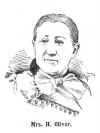Wisconsin Infantry June 1, 1861; was in the battle of Ganisville (??), second Bull Run, South Mountain and Antietam.
Here he received a musket ball through the right lung September 17, 1862; which cut short his army career; he was discharged January 29, 1863.
He took land adjoining John's farm, sold out and left with him in 1875. He came back in '86 and bought Dave Close's homestead where he now lives.
John and Isaiah Williams have been partners since first coming to Norton county in every thing they possessed, even to their farming utensils, and are scarcely ever seen apart.
This can be accounted for, to a certain extent because their wives were sisters.
When they come here in 1873 a sister of their wives come with them, Miss Minerva Stiles; she was at that time in feeble health, she died of consumption June 10, 1873, and was buried on the land now owned by the Lincoln Land company, just north of John Hamilton's old stone house, but was afterward removed to the present cemetery by William H. Hart.
After the cemetery was replatted, it left her grave in an alley; she was again taken up and buried on the William's lot.
Hers was the first natural death of any white person in Norton county.
Miss Emeline Williams, sister of the Williams brothers, was born February 8, 1834; was married to George W. Hope March 22, 1856.
He enlisted in the same Wisconsin company with John Williams. He died at Memphis, Tenn., September 21, 1863 while in the service.
His four sons, the eldest John Albert, was born February 10, 1856; he resides in Emmett township, has never married.
Their second son, Charles F. Hope was born September 6, 1857, died December 18 1863; Milton G. was born August 31, 1859.
He left here some years ago; since that time he married Miss Emma High also well known here.
He is in business in Vale, Oregon, with his younger brother, Isaiah who is also married.
Isaiah was born September 28, 1861.
 Mrs. Hope settled on the land east of Henry Oliver, the same is now owned by William Simpson.
She pitched her camp in the draw but had not got her dug out finished when a heavy rain which occurred on the last day of April washed her camp completely away, including several sacks of flour, one barrel of pork, groceries etc; supplies enough to last until they could raise a crop.
Henry Oliver seeing the predicament she was in invited the widow and her sons to come over and live in his dugout until hers was completed.
She accepted his neighborly offer with some hesitancy, of course, but being without a place to lay her head she did not take up much time in deciding to go over.
Mrs. Hope settled on the land east of Henry Oliver, the same is now owned by William Simpson.
She pitched her camp in the draw but had not got her dug out finished when a heavy rain which occurred on the last day of April washed her camp completely away, including several sacks of flour, one barrel of pork, groceries etc; supplies enough to last until they could raise a crop.
Henry Oliver seeing the predicament she was in invited the widow and her sons to come over and live in his dugout until hers was completed.
She accepted his neighborly offer with some hesitancy, of course, but being without a place to lay her head she did not take up much time in deciding to go over.
After Henry had finished the inquest on Chapman, May 4, he recognized the danger of solitary life and decided that he would not again live alone if he could
prevail on the widow to remain with him. Everything run (sic) along smoothly until August 12.
Henry had in the meantime proved up on his land, so when Mrs. Hope got ready to move back to her dugout he was ready to go along.
Squire Oliver was a widower, his wife having died in New York before he moved to Kansas.
Sol Marsh and Charley Hillsinger at this time had been plowing for Squire Oliver; Sol's team of oxen every time he unhitched from the plow for dinner, used
to go the Prairie Dog for drink, and as often as they reached the steep bank plunged in, swam across, scaled the opposite bank and left Solly in one of his
sweet tempers spiced with blasphemy. On this day Solly followed the oxen with blood in his eye bent on breaking their heads or habits: and just as he was emerging from the water, clothes and all, Squire Oliver appeared upon the opposite
|